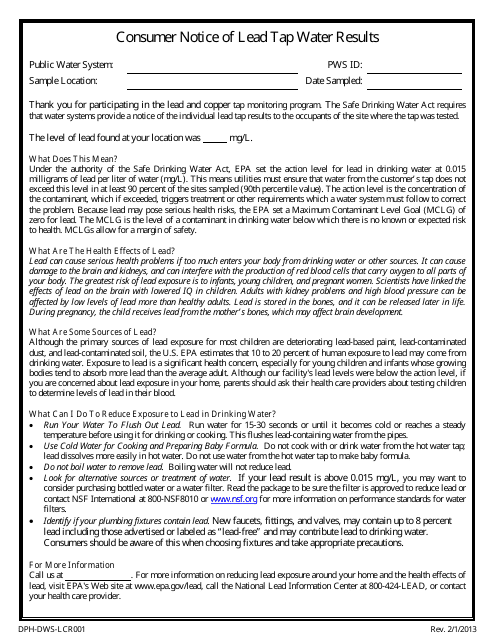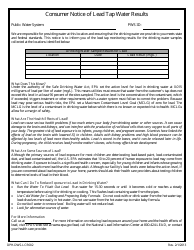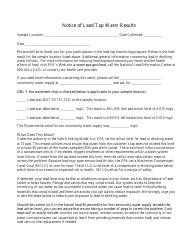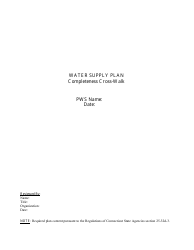This version of the form is not currently in use and is provided for reference only. Download this version of
Form DPH-DWS-LCR001
for the current year.
Form DPH-DWS-LCR001 Consumer Notice of Lead Tap Water Results - Connecticut
What Is Form DPH-DWS-LCR001?
This is a legal form that was released by the Connecticut State Department of Public Health - a government authority operating within Connecticut. As of today, no separate filing guidelines for the form are provided by the issuing department.
FAQ
Q: What is Form DPH-DWS-LCR001?
A: Form DPH-DWS-LCR001 is a consumer notice that provides information about lead tap water results in Connecticut.
Q: Who is required to use Form DPH-DWS-LCR001?
A: Public water systems in Connecticut are required to use Form DPH-DWS-LCR001 to notify their customers about lead tap water results.
Q: What does Form DPH-DWS-LCR001 contain?
A: Form DPH-DWS-LCR001 contains information about lead levels in tap water, as well as actions that can be taken to reduce exposure to lead.
Q: How can I obtain a copy of Form DPH-DWS-LCR001?
A: You can obtain a copy of Form DPH-DWS-LCR001 from your public water system or the Connecticut Department of Public Health.
Q: What should I do if my tap water has high lead levels?
A: If your tap water has high lead levels, you should take actions such as using a certified lead filter or contacting your water utility for further guidance.
Q: Is the use of Form DPH-DWS-LCR001 mandatory?
A: Yes, public water systems in Connecticut are required by law to use Form DPH-DWS-LCR001 to notify their customers about lead tap water results.
Q: Can I rely on Form DPH-DWS-LCR001 to determine if my tap water is safe?
A: Form DPH-DWS-LCR001 provides information about lead levels in tap water, but it is recommended to contact your water utility for further testing and guidance.
Q: What are the health effects of drinking water with high lead levels?
A: Drinking water with high lead levels can have various health effects, including neurological and developmental issues, especially in young children.
Q: How can I reduce my exposure to lead in tap water?
A: You can reduce your exposure to lead in tap water by using a certified lead filter, flushing your pipes before using tap water, and using cold water for drinking and cooking.
Q: What should I do if I am concerned about lead in my tap water?
A: If you are concerned about lead in your tap water, you should contact your water utility for further testing and guidance.
Form Details:
- Released on February 1, 2013;
- The latest edition provided by the Connecticut State Department of Public Health;
- Easy to use and ready to print;
- Quick to customize;
- Compatible with most PDF-viewing applications;
- Fill out the form in our online filing application.
Download a fillable version of Form DPH-DWS-LCR001 by clicking the link below or browse more documents and templates provided by the Connecticut State Department of Public Health.




